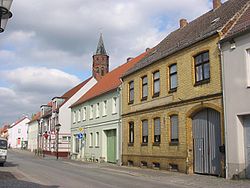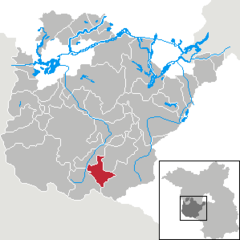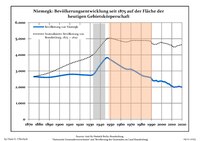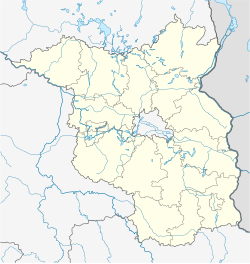Niemegk
Niemegk | |
|---|---|
 Main road | |
Location of Niemegk within Potsdam-Mittelmark district  | |
| Coordinates: 52°05′N 12°42′E / 52.083°N 12.700°E | |
| Country | Germany |
| State | Brandenburg |
| District | Potsdam-Mittelmark |
| Municipal assoc. | Niemegk |
| Subdivisions | 2 Ortsteile |
| Government | |
| • Mayor (2024–29) | Klemens Wiegand[1] |
| Area | |
• Total | 44.81 km2 (17.30 sq mi) |
| Elevation | 75 m (246 ft) |
| Population (2022-12-31)[2] | |
• Total | 2,069 |
| • Density | 46/km2 (120/sq mi) |
| Time zone | UTC+01:00 (CET) |
| • Summer (DST) | UTC+02:00 (CEST) |
| Postal codes | 14823 |
| Dialling codes | 033843 |
| Vehicle registration | PM |
| Website | www.amt-niemegk.de |
Niemegk (German: [ˈniː.mɛk] ) is a town in the Potsdam-Mittelmark district, in Brandenburg, in eastern Germany. It is the administrative seat of the Amt ("collective municipality") Niemegk.
Geography
[edit]The municipal area is situated on the northeastern slopes of the Fläming Heath, east of the Plane river. The surrounding region comprises farmland and extended forests adjoining the High Fläming Nature Park. The town centre is located about 10 km (6.2 mi) southeast of Bad Belzig, and 23 km (14 mi) north of Wittenberg.
The town has access to the Bundesautobahn 9 highway at the Niemegk junction.
History
[edit]A Burgward at the former site of a Slavic fortress (gord) was first mentioned in an 1161 deed, at the time when the Ascanian margrave Albert the Bear conquered the Hevelli lands in the north. The name Nymik or Niemeke is possibly derived from the town of Nijmegen in the Low Countries, the place of origin of German settlers. The estates were held by the Teutonic Order and the former village was vested with town privileges in 1228.
Since the mid 13th century, the area was part of the Ascanian Duchy of Saxe-Wittenberg and, from 1356, of the Saxon electorate. Located on its northeastern border, it was the scene of numerous conflicts with Brandenburg knights and the forces of the Magdeburg archbishops. The town again suffered from Hussite raids in 1429, marauding Imperial troops after the Saxon defeat at the 1547 Battle of Mühlberg, and was devastated in the Thirty Years' War.
After the Napoleonic Wars and the 1815 Congress of Vienna, the town fell to Prussia and was incorporated into the Province of Brandenburg. From 1868, young Robert Koch worked in Niemegk as a country doctor.
During World War II, Niemegk was the location of a subcamp of the Sachsenhausen concentration camp for prisoners of various nationalities, especially Norwegians, but also Dutch, Poles (including kidnapped children, which were to be Germanized and adopted by German families), French, Czechs, Russians, Britons, Germans.[3] After the war, the town was part of East Germany.
Demography
[edit]
|
|
Politics
[edit]
Seats in the town's assembly (Stadtverordnetenversammlung) as of 2014 local elections:
- Zukunft Niemegk (independent): 3
- Social Democratic Party of Germany (SPD): 3
- Christian Democratic Union of Germany (CDU): 2
- Free Democratic Party (FDP): 1
- Free Voters: 1
- The Left: 1
- Individual candidate: 1
Notable people
[edit]- Dieter Appelt (born 1935), photographer
References
[edit]- ^ Landkreis Potsdam-Mittelmark Wahl der Bürgermeisterin / des Bürgermeisters. Retrieved 10 July 2024.
- ^ "Bevölkerungsentwicklung und Bevölkerungsstandim Land Brandenburg Dezember 2022" (PDF). Amt für Statistik Berlin-Brandenburg (in German). June 2023.
- ^ Megargee, Geoffrey P. (2009). The United States Holocaust Memorial Museum Encyclopedia of Camps and Ghettos 1933–1945. Volume I. Indiana University Press, United States Holocaust Memorial Museum. p. 1331. ISBN 978-0-253-35328-3.
- ^ Detailed data sources are to be found in the Wikimedia Commons.Population Projection Brandenburg at Wikimedia Commons
External links
[edit]- Municipal website (in German)




